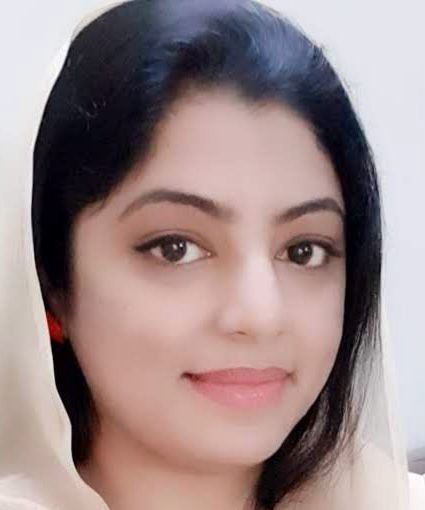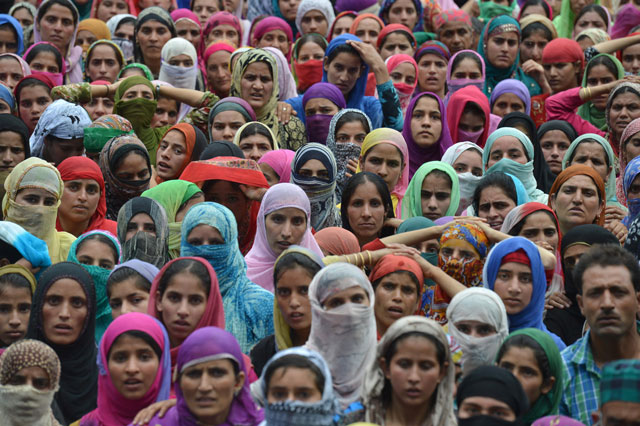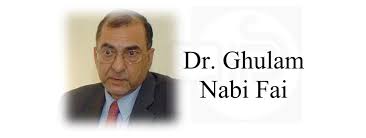
On March 8th, International Women’s Day, the global community comes together to recognize the achievements of women and advocate for gender equality. In 2024, the United Nations theme, “Invest in women: Accelerate progress,” underscores the necessity of empowering women worldwide. However, in Kashmir, the observance of International Women’s Day takes on a solemn tone, eclipsed by the harsh realities of conflict and occupation. For the women of this region, March 8th serves as a poignant reminder of their ongoing struggles rather than a cause for celebration.
In Jammu and Kashmir, women have borne the brunt of the Indian occupation, emerging as both direct and indirect victims of state-sponsored violence. The loss of loved ones, including husbands, brothers and sons, has given rise to a unique category known as ‘half-widows’—women trapped in the abeyance of uncertainty about the fate of their missing husbands. The region buzzed with whispered tales of societal hurdles of half widows after their partners went missing. This plight is compounded by the psychological trauma of rape and sexual assault, where victims face both the initial abuse and subsequent condemnation by patriarchal norms. The multifaceted impact of the sexual assault on women is evident in psychological, emotional, economic and educational spheres.

The staggering numbers reveal the scale of this silent tragedy. IoK is home to between 2,000 and 2,500 half-widows, each bearing the weight of profound loss and unresolved grief. Compounding this sorrow, 6,000 orphans, the children of these half-widows, navigate the challenges of growing up in the aftermath of a conflict that has left them deeply scarred. However, these figures are only the tip of the iceberg, with the true count believed to be much higher, obscured by the pervasive shroud of fear and uncertainty that engulfs the region. This unique and tragic category has burgeoned, with their numbers swelling to over thousands in recent years. What sets these women apart is the excruciating pain and agony they endure, a burden that surpasses even that borne by other women whose loved ones have tragically fallen to the bullets of the Indian army.
The Tragedy of Enforced Disappearances and Half-Widows
In the chaos of the Kashmir conflict, enforced disappearances emerge as a weapon wielded by the Indian state, a strategic tool to assert dominance over the rights of the Kashmiri people. While men predominantly bear the brunt of enforced disappearances, the repercussions extend to Kashmiri women, who disproportionately shoulder the burdens emanating from such heinous acts.
In this context, enforced disappearances unfold as a sinister aspect of warfare, a means through which the Indian state seeks to establish hegemony during the conflict in Kashmir. The suffering is not confined to the disappeared individuals alone; it permeates the fabric of Kashmiri society, affecting men and women alike.
The haunting spectre of enforced disappearances in Indian occupied Jammu and Kashmir has been a longstanding and distressing issue for families. The term refers to cases where individuals go missing and the circumstances surrounding their disappearance are shrouded in uncertainty and fear. The matter gained attention in early 1989 in Jammu and Kashmir when young men began to resist and vocalize slogans against the Indian occupation of the region. This marked the beginning of a tragic period that has left families in deep sorrow and hopelessness.
One significant challenge in addressing this problem is the lack of thorough investigations. Since the outset, proper inquiries into these disappearances have been scarce, making it difficult to understand the full scope of the issue. The fear of retaliation and reprisal discourages many affected families from reporting these cases, leading to an incomplete documentation of the problem. As a result, the true number of individuals who have gone missing remains unknown. However, it is said that, more than 8,000 men disappeared during the turbulent period spanning the late 1980s to the early 2000s. The Indian government, however, has provided widely varying figures for these disappearances, ranging from 1,105 to 3,931. The unsettling reality of mass unidentified graves scattered across the region serves as a haunting reminder of these enforced disappearances. In August 2011, the State Human Rights Commission (SHRC) in Jammu and Kashmir revealed the discovery of 2,730 unidentified bodies interred in unmarked graves in 38 sites across three districts in northern Kashmir, a comprehensive investigation into these mass graves is yet to take place.
Article 2 of the United Nations Convention against Torture categorizes enforced disappearance as a grave violation, encompassing actions like arrest, detention, abduction, or any form of liberty deprivation carried out by state agents or individuals acting with state authorization, support, or acquiescence. The subsequent refusal to acknowledge the deprivation of liberty or the concealment of the disappeared person’s fate or whereabouts removes them from the protection of the law.
The process of filing a missing persons report in Srinagar unfolds as a daunting ordeal, fraught with obstacles that only compound the distress of affected families. Attempts to report missing members often lead to police pressure and intimidation, coercing some families into withdrawing their complaints out of sheer fear. Others, determined to seek justice, find themselves navigating through different courts merely to register a First Information Report (FIR). This arduous journey reflects the dire challenges families face in their pursuit of truth and justice.
Adding to the irony of this distressing situation is the fact that government relief pensions, a nominal sum of 100,000 rupees ($2,253) per year, are granted only after families obtain a death certificate from district authorities. However, there is a cruel catch – families must first prove that the missing victim was not involved in any activities construed as political militancy. This bureaucratic hurdle adds insult to injury, further delaying assistance to families in dire need.
Identity Crisis and the Dilemma of Remarriage
A silent crisis looms over thousands of women caught in an identity crisis, grappling with the ambiguity of their marital status. This struggle not only reflects a cultural gap but also sheds light on the overlooked needs and equality issues faced by women in the region.
Thousands of women, termed as “half-widows,” find themselves in a perplexing situation where their marital status remains uncertain. The lack of a clear declaration regarding the fate of their missing husbands plunges them into an ongoing identity crisis. This predicament is emblematic of a cultural divide in Kashmir, where the rights and equality of women often go unrecognized, leaving these women languishing in the shadows of uncertainty.
To declare a missing person legally dead, the intervention of a cleric well-versed in Sharia law is necessary. Unfortunately, these clerics seem to be in a state of indifference, unwilling to acknowledge the agony faced by the half-widows. As a result, these women are denied the rights they rightfully deserve. Their struggle doesn’t neatly fit into the categories established by various NGOs, orphanages, or widows’ homes, further exacerbating their plight.
A fraction of half-widows contemplates remarriage, but numerous factors contribute to a complex decision-making process. Many hesitate, holding onto the belief that they will eventually receive information about their husbands. For others, the fear that a stepfather might not accept or provide the best for their children acts as a deterrent. Even for those considering remarriage, social stigmas remain robust and interpretations of religious rules surrounding remarriage are contested.
Despite the worldwide focus on women’s empowerment, the plight of widows and half-widows in Kashmir remains largely overlooked. These women face unimaginable hardships, grappling with the uncertainty of their missing loved ones while navigating societal stigma and barriers to accessing their rights.
As the international community rallies around the UN theme, it must also acknowledge and address the challenges faced by Kashmiri women, elevating their voices and advocating for their rights. Until the plight of widows and half-widows in Kashmir is addressed, March 8th will remain not a day of celebration, but another arduous chapter in their relentless struggle for justice and dignity.
The author is head of the research and human rights department of the Islamabad-based think tank Kashmir Institute of International Relations (KIIR). She can be contacted at the following email address: mehr_dua@yahoo.com
Note: The views expressed in the write up are those of the author’s and do not necessarily reflect the position of the KMS.








